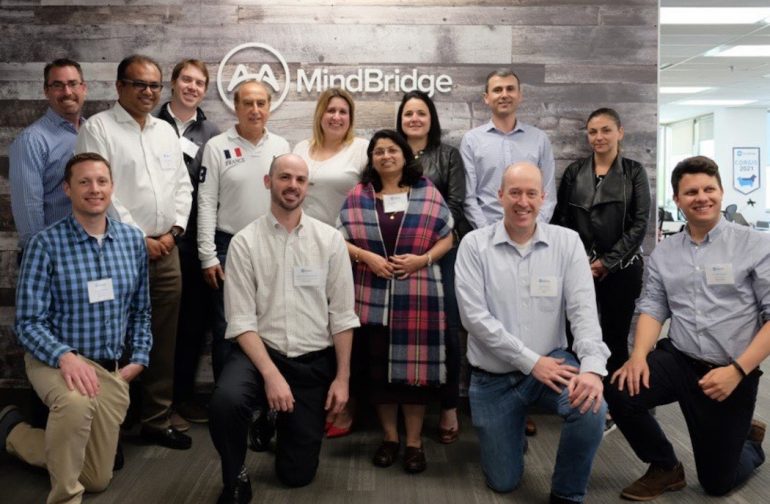Last week, it was announced that MindBridge Analytics, the Ottawa-based AI company, had received $14.5 million from the federal government on the heels of a $15.1 million venture capital round.
MindBridge currently operates in FinTech with its AI-powered detection software for auditors, but the company is working on something that it says could go well beyond finance. Almost all of the government funding, which will be delivered periodically over the next seven years, will be put towards research and development for the company’s $140.8-million project.
BetaKit spoke with MindBridge CEO Eli Fathi about the new project as well as how the company managed to quickly secure nearly $30 million.
A Microsoft for AI applications
MindBridge’s existing base technology was pivotal to the initiation of this $140 million venture, Fathi told BetaKit. The AI Auditor identifies unusual transactions by looking at the monetary flows between accounts, all credits and debits, rather than scanning accounts and entries in isolation. This method, the company says, provides users with a more fulsome view into the state of their data, allowing them to better understand individual transactions and identify potential issues. The goal of the software was to provide an indispensable tool to auditors, rather than replace them.
“It’s a slow process, but it was a brilliant approach in that we are addressing an area that we are leading in.”
The Ottawa-based company’s goal for the auditor was arguably challenging from the start. Transforming an entire profession through software is one task, but addressing one that is licensed and regulated is another. Fathi noted that that regulatory body in many industries tend to lag in their understanding of new technologies, this makes for slow adoption. Fathi argued, however, that there is value for Mindbridge in being first to market.
“It’s a slow process, but it was a brilliant approach in that we are addressing an area that we are leading in,” Fathi said. “There is no other company that is doing this.”
The new $140 million project came about after a realization that MindBridge CTO, Robin Grosset had designed MindBridge’s base technology in a way that could move well beyond one single application. Fathi said the company proved this theory by developing several bespoke solutions over the last three years for larger companies like Bank of England and Payments Canada.
“We found that our base product is applicable to many disparate bespoke solutions,” he said. “So we thought, ‘let’s take that and develop a platform with it.’”
Fathi said the company’s goal is to have an AI-powered platform that enables organizations and enterprises to develop applications, without needing a data scientist. In the same way that Microsoft hosts a variety of applications, like Word or Excel, MindBridge’s enterprise platform hopes to act as an operating system for applications. The company is looking to fuel not just the entire financial industry, but many other industries as well. Mindbridge’s plan is to have the platform ready within the next 18 months.
Slow and steady
MindBridge’s recently raised capital amounts to nearly $30 million, with the company having raised around $45 million to date. Instrumental to this growth, Fathi said, was hiring Grosset. The CEO stated that in 2015, during the early days of AI, not many companies had anything close to Grosset’s level of expertise. Prior to Mindbridge Grosset founded several software startups that were later acquired by Cognos as well as IBM, where he was a technical executive and an IBM Distinguished Engineer.
“We want to function and act as if we are an IPO-ready company.”
“For us, it was important to have an entrepreneur, someone who was already at the top of the food chain,” Fathi said.
Fathi himself joined MindBridge full-time in the fall of 2015. He told BetaKit that he was determined to ensure the company was on solid footing before competing in an emerging market. He stated that he built four “engines”: the product engine (led by Grosset), the sales and growth engine, the support engine, and the AI solution. It was imperative for these four engines to be led by the right people and function cooperatively, Fathi stated.
His method was to avoid the typical route of startups that “ignore process and documentation,” and move fast to write code. This often leaves startups with technical debt, a concept in software development referring to the cost of added revising caused by opting for an easy solution sooner over a better solution that would take longer.
Fathi had also served on the board of a publicly-traded company that conducted management discussion and analysis every quarter and he decided to bring this structure to MindBridge. The AI company, itself, has previously stated its intention to go public. In fact, after Mindbridge raised a seed round in 2017, Fathi said all employees at the time signed an “IPO-ready 2021” declaration. That same year the company also stated plans to generate $100 million in revenue by 2021. Fathi told BetaKit that while he did not want to disclose the company’s financial results for competitive reasons, the plan is still to be IPO-ready by December 2021.
“We want to function and act as if we are an IPO-ready company,” he said. “If you ask our VCs, they’ll tell you… that we behave as if we are a [D] round, rather than an A round. There’s still a lot to fix, but we have the right infrastructure to move it to the next level.”
Image courtesy MindBridge via Twitter


